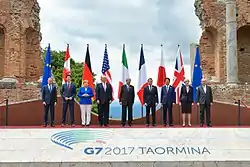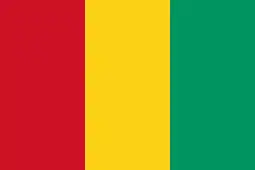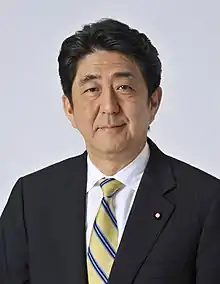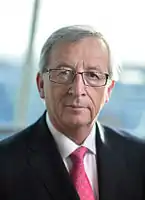43rd G7 summit
The 43rd G7 summit was held on 26–27 May 2017[1] in Taormina (ME), Sicily, Italy.[2] In March 2014, the G7 declared that a meaningful discussion was currently not possible with Russia in the context of the G8. Since then, meetings have continued within the G7 process.
| 43rd G7 summit | |
|---|---|
 | |
 | |
| Host country | Italy |
| Date | 26–27 May 2017 |
| Venue(s) | Taormina (ME), Sicily, Italy |
| Participants | |
| Follows | 42nd G7 summit |
| Precedes | 44th G7 summit |
| Website | www |
It was the first time since 1987 that the G7 summit held in Italy was not hosted by Silvio Berlusconi. The participation of Angela Merkel and Theresa May made it the first time two G7 female leaders were principals in the G7 summit.
The choice of Taormina as the headquarters of the G7 was announced by the then Prime Minister Matteo Renzi on 4 July 2016. The summit was initially scheduled to take place in Florence. Among the reasons for the change of choice, Renzi cited the words of an international leader at a previous summit that with a joke had highlighted his prejudice against Sicily pointing out as the land of the Mafia and claimed that those words had convinced him to fix the G7 in Sicily.
Leaders at the summit


The attendees include the leaders of the seven G7 member states as well as representatives of the European Union. The President of the European Commission has been a permanently welcome participant at all meetings and decision-making since 1981.
The 43rd G7 summit was the first summit for British Prime Minister Theresa May, French President Emmanuel Macron, and U.S. President Donald Trump. It was also the first and only summit for Italian Prime Minister Paolo Gentiloni.
Participants
| Core G7 members Host state and leader are shown in bold text. | |||
| Member | Represented by | Title | |
|---|---|---|---|
| Canada | Justin Trudeau | Prime Minister | |
| France | Emmanuel Macron | President | |
| Germany | Angela Merkel | Chancellor | |
| Italy | Paolo Gentiloni | Prime Minister | |
| Japan | Shinzō Abe | Prime Minister | |
| United Kingdom | Theresa May | Prime Minister | |
| United States | Donald Trump | President | |
| European Union | Jean-Claude Juncker | Commission President | |
| Donald Tusk | Council President | ||
| Guest Invitees (Countries) | |||
| Member | Represented by | Title | |
| Ethiopia | Hailemariam Desalegn | Prime Minister | |
| Guinea | Alpha Conde | President | |
| Kenya | Uhuru Kenyatta | President | |
| Niger | Mahamadou Issoufou | President | |
| Nigeria | Yemi Osinbajo | Acting President | |
| Tunisia | Beji Caid Essebsi | President | |
Agenda
The G7 leaders emphasized common endeavours: to end the Syrian crisis, to fulfill the UN mission in Libya and reducing the presence of ISIS, ISIL and Da'esh in Syria and Iraq. North Korea was urged to comply with UN resolutions, Russian responsibility was stressed for the Ukraine conflict. Supporting economic activity and ensuring price stability was demanded while inequalities in trade and gender were called to be challenged. It was agreed to help countries in creating conditions that address the drivers of migration: ending hunger, increasing competitiveness and advancing global health security.[3]
Gallery of participating leaders
Invited guests


 Guinea
Guinea
Alpha Conde,
President
.jpg.webp)
.jpg.webp)

International organizations
See also
References
- "Renzi announces to host G7 summit in 2017 in Taormina". Rai News24. 26 May 2016. Retrieved 27 May 2016.
- G7 a Taormina, è ufficiale. Renzi chiama da Boston il sindaco Giardina: «Il vertice si farà nella Perla»
- "G7 Taormina Leaders' Communiqué" (PDF). G7 Italy 2017. 27 May 2017. Retrieved 11 June 2017.

.jpg.webp)



_(cropped).jpg.webp)

.jpg.webp)


.jpg.webp)


_(cropped).jpg.webp)
